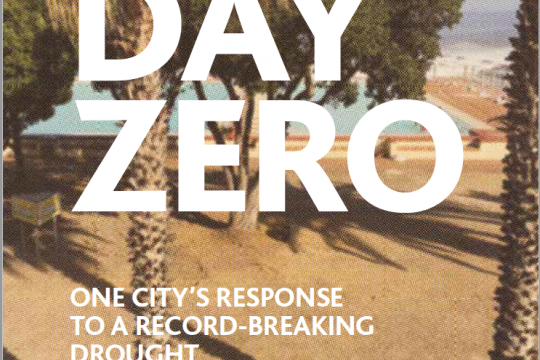The importance of economics researchers working with cities to drive water-use behaviour and evidence-based water planning during a climate shock, such as a drought, comes through in a new book launched in Cape Town, South Africa, last week.
Day Zero: One City’s Response to a Record-Breaking Drought looks at how Cape Town responded to the water crisis in the summer of 2018, when municipal dams nearly ran empty. The short book shows how behaviour economists ‘green nudging’ interventions, and other efforts to track household water use during the drought, helped drive water-saving behaviour. Day Zero also shows how analysis relating to the management of invasive alien trees in the city’s main dam catchments helped inform longer-term sustainable water planning by the city.
Researchers at the University of Cape Town’s Environmental Policy Research Unit (UCT EPRU) monitored household water use throughout the three-year drought from 2015 to 2018. The work measured how people responded to different supply side management efforts, such as price hikes, water restrictions, communication campaigns, and ‘green nudging’ interventions. The findings of EPRU director Prof Martine Visser and her team feature in Day Zero, published by the UCT African Climate & Development Initiative (ACDI) last week.
Meanwhile former EPRU director Dr Jane Turpie’s analysis of the extent of water use in the city’s dam catchments by invasive alien trees showed how the presence of these wild and farmed alien trees threaten the recharging of dams in the area. The number-crunching produced by this analysis shows that a relatively small financial investment over 30 years could release as much as two months’ supply of water back into the catchments, measured relative to the daily consumption targets set at the height of the city’s water restrictions in 2018 (just under 500 million litres of water per day).
Day Zero captures many of the lessons learned as the city administration and residents navigated the water crisis, following the worse drought in over a century of record-keeping. The book gives the perspective of politicians, water managers, the city’s communication responsibilities, and the role of external experts and researchers in supporting evidence-based thinking. These lessons apply to any city facing the challenges of growing water demands and inherited development and service delivery backlogs, when these collide with a climate shock like this drought.
Download Day Zero: One City’s Response to a Record-Breaking Drought, and watch this short video.
